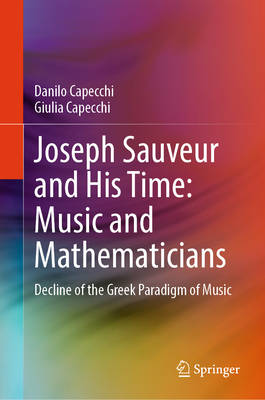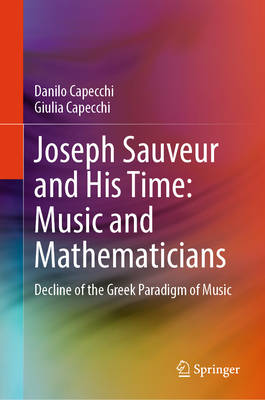
Bedankt voor het vertrouwen het afgelopen jaar! Om jou te bedanken bieden we GRATIS verzending (in België) aan op alles gedurende de hele maand januari.
- Afhalen na 1 uur in een winkel met voorraad
- In januari gratis thuislevering in België
- Ruim aanbod met 7 miljoen producten
Bedankt voor het vertrouwen het afgelopen jaar! Om jou te bedanken bieden we GRATIS verzending (in België) aan op alles gedurende de hele maand januari.
- Afhalen na 1 uur in een winkel met voorraad
- In januari gratis thuislevering in België
- Ruim aanbod met 7 miljoen producten
Zoeken
Joseph Sauveur and His Time: Music and Mathematicians
Decline of the Greek Paradigm of Music
Danilo Capecchi, Giulia Capecchi
Hardcover | Engels
€ 192,45
+ 384 punten
Omschrijving
This book focuses on the shift in the perception of music by educated classes, from the Greek view as an essentially rational enterprise to the modern view as an essentially artistic enterprise. One of the main parties responsible for the decline of the Greek view was Joseph Sauveur. Although historians universally acknowledge his foundational contributions to the evolution of music, there is a paucity of comprehensive scholarship on his life and work. This book aims to address this gap. A mathematician contemporary of Newton and Leibniz, Sauveur was admitted to the Académie des sciences of Paris in 1696. He then began seeking to establish the science of sound on an equal footing with optics, claiming that it could no longer be considered a branch of music. He proposed the name acoustics, which was perhaps not entirely new. To better understand Sauveur's role in abandoning the Greek view, this paper briefly examines the evolution of music. First, it looks at ancient Greece, where the view originated. Then, it examines the early scientific era, when the shift in view began. Finally, the paper explains Helmholtz's contributions to the development of modern acoustics, which built upon Sauveur's work.
Specificaties
Betrokkenen
- Auteur(s):
- Uitgeverij:
Inhoud
- Aantal bladzijden:
- 524
- Taal:
- Engels
Eigenschappen
- Productcode (EAN):
- 9783032047069
- Verschijningsdatum:
- 30/01/2026
- Uitvoering:
- Hardcover
- Formaat:
- Genaaid
- Afmetingen:
- 155 mm x 235 mm
- Gewicht:
- 1003 g

Alleen bij Standaard Boekhandel
+ 384 punten op je klantenkaart van Standaard Boekhandel
Beoordelingen
We publiceren alleen reviews die voldoen aan de voorwaarden voor reviews. Bekijk onze voorwaarden voor reviews.









